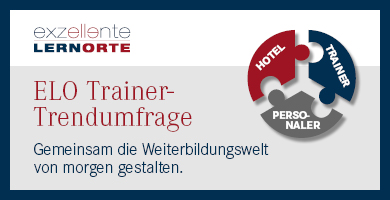Branchenwissen aus erster Hand – entdecken Sie Beiträge von führenden Köpfen rund um People & Culture, Leadership, Performance und mehr.

HR, wach auf! Mit Flickenteppichen gewinnst du kein Morgen mehr
26.06.2025 Strategisches Arbeiten trotz operativem Chaos? In vielen mittelständischen Unternehmen bleibt HR hinter ihrem Potenzial zurück – zersplittert, überlastet, unterschätzt. Dieser Artikel zeigt, warum echte Organisational Performance nur gelingt, wenn Prozesse, Daten und Systeme zusammenspielen – und wie HR zur Steuerzentrale der Zukunft wird.
ZUM ARTIKEL
Ambiguitätstoleranz als Future Skill: Klar denken, wo nichts eindeutig ist
26.06.2025 In einer Welt, die immer stärker in Gegensätzen denkt, wird die Fähigkeit zur Ambiguitätstoleranz zur Schlüsselkompetenz. Der Artikel zeigt, warum differenziertes Denken, kognitive Flexibilität und das Aushalten von Mehrdeutigkeit nicht nur persönliche Reife fördern, sondern auch zu besseren Entscheidungen, mehr Empathie und echter Offenheit führen – im Alltag, im Job und im gesellschaftlichen Diskurs.
ZUM ARTIKEL
Hybrides Arbeiten ist nicht die Zukunft – es ist längst Realität
26.06.2025 KI-gestützte Employee Services helfen Unternehmen im hybriden Arbeitsumfeld, Produktivität und Zufriedenheit zu steigern. Hybride Modelle sind Standard, erfordern aber smarte Lösungen zur Produktivitätsmessung und Vermeidung von App-Chaos.
ZUM ARTIKEL
Kosten oder Investition? Budgetierungstipps für effektives Gesundheitsmanagement
18.06.2025 Gesundheitsmanagement ist weit mehr als ein Kostenfaktor – es ist ein strategischer Hebel für Unternehmenserfolg, Resilienz und Mitarbeiterbindung. Der Artikel zeigt, wie Organisationen mit klaren Zielen, gezielter Analyse und einem realistischen Budget den Wandel von der Einzelmaßnahme zum wirksamen System schaffen – und warum Kommunikation dabei der Schlüssel ist.
ZUM ARTIKEL
New Work und Führung: Zwischen Wandel und Verantwortung
18.06.2025 New Work braucht mehr als Homeoffice und Tools – es braucht Führung mit Haltung, Vertrauen und echter Beziehung. Der Artikel zeigt, wie psychologische Sicherheit, gesunde Routinen und eine klare Wertebasis Teams stärken, Zusammenarbeit fördern und Führung neu definieren. Für alle, die New Work nicht nur umsetzen, sondern wirklich leben wollen.
ZUM ARTIKEL
Klar führen in einer lauten Welt: Mit Natur und Bewegung zu mehr Präsenz und Leistungsfähigkeit
18.06.2025 Führung braucht heute mehr als Effizienz – sie braucht Präsenz, Klarheit und Verbindung. Dieser Artikel zeigt, wie Natur, Bewegung und bewusst gesetzte Pausen neue Energie und Tiefe in den Führungsalltag bringen. Plus: 5 konkrete Tools für gesunde Selbst- und Teamführung, die sich einfach umsetzen lassen – für alle, die nicht nur funktionieren, sondern wirksam führen wollen.
ZUM ARTIKEL
Employer Branding ist kein Luxus – sondern Rettung auf Raten
12.06.2025 Employer Branding braucht keine neuen Buzzwords, sondern klare Strategien, realistische Wege und gezielte Kompetenz. Jetzt ist der ideale Moment, um Grundlagen zu legen, bevor 2026 beginnt – mit Struktur, Haltung und smarter KI-Unterstützung.
ZUM ARTIKEL
Führungskräfteentwicklung neu gedacht: Warum alte Rezepte nicht mehr wirken – und wie KI zum Gamechanger werden kann
06.06.2025 Viele Unternehmen investieren viel Geld in Führungskräfteentwicklung – und sehen dennoch kaum Veränderung. Woran liegt das? Max Braunleder geht genau dieser Frage auf den Grund und zeigt, warum klassische Trainings oft scheitern, was stattdessen wirklich wirkt und wie KI dabei helfen kann, Führung nachhaltig zu entwickeln.
ZUM ARTIKEL
Mit KI und digitalen Assistenten rasant in die Zukunft
06.06.2025 Ein beruflicher Neuanfang mit KI: Persönliche Erlebnisse, neue Perspektiven auf Führung und Nachhaltigkeit sowie inspirierende Geschichten meiner Enkelkinder zeigen, wie digitale Assistenten unser Arbeiten, Lernen und Denken nachhaltig verändern können.
ZUM ARTIKEL
Wie fünf einfache Fragen dein Team motivieren, produktiver machen und Kündigungen senken
06.06.2025 Was macht empathische Führung aus? Oft reicht schon eine gute Frage. Der Artikel zeigt, wie du mit fünf einfachen, ehrlichen Fragen Vertrauen stärkst, Potenziale erkennst und dein Team wirksam begleitest – ohne Coach-Ausbildung, aber mit echtem Interesse.
ZUM ARTIKEL
Der blinde Fleck der Intellektuellen – Wie sie mit Ignoranten sprechen
28.05.2025 Modlers Buch analysiert den Umgang mit "Ignoranten" in Debatten anhand vertikaler (Status) und horizontaler (Argumente) Kommunikation. Vertikale Kommunikation eskaliert in High, Basic und Move Talk. Erfolgreiche Kommunikation erfordert "sprachliche Zweisprachigkeit" und Anpassung an die Ebene des Gegenübers, besonders gegenüber Ignoranz-Taktiken.
ZUM ARTIKEL
Vom Wissenstransfer zur Wissensbewahrung mit künstlicher Intelligenz
28.05.2025 Im Fachkräftemangel kann künstliche Intelligenz helfen, das Wissensmanagement zu optimieren und Wissen im Unternehmen sichtbar, nutzbar und dauerhaft verfügbar zu machen.
ZUM ARTIKEL
ELO-Trainerumfrage zeigt, wo es 2025 noch immer klemmt
22.05.2025 Welches sind die größten Fehler und Missverständnisse in der Planung und Buchung von Veranstaltungen? Die zweite deutschlandweite Trainerumfrage der Exzellenten Lernorte liefert Antworten.
ZUM ARTIKEL
Fachkräftemangel meistern - Mit Kommunikation, die alle erreicht
22.05.2025 Fachkräftemangel auf der Fläche? Mit moderner digitaler Kommunikation sorgen Sie für mehr Effizienz und Engagement und können operative Mitarbeitende langfristig binden.
ZUM ARTIKEL
Je dunkler es draußen wird, desto heller müssen wir scheinen.
22.05.2025 In unsicheren Zeiten ist es entscheidend, Hoffnung, Empathie und Zusammenhalt zu stärken. Jeder kann sein eigenes Licht entzünden, um Dunkelheit zu erhellen. Initiativen wie Schulworkshops und eine "Glücksperlen"-Aktion fördern positive Gefühle und Gemeinschaft. Inspiriert von persönlichen Schicksalsschlägen, wird dazu aufgerufen, sich auf verbindende Elemente zu konzentrieren und gemeinsam eine bessere Zukunft zu gestalten.
ZUM ARTIKEL